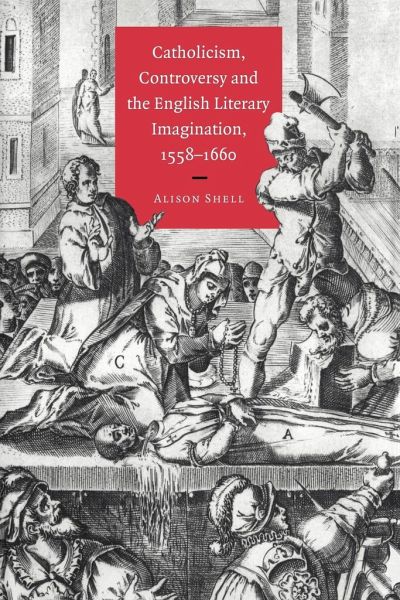
Catholicism, Controversy and the English Literary Imagination, 1558 1660
Versandkostenfrei!
Versandfertig in 1-2 Wochen
53,99 €
inkl. MwSt.
Weitere Ausgaben:

PAYBACK Punkte
27 °P sammeln!
Rediscovers a Catholic literary tradition and exposes the anti-Catholicism of mainstream Tudor and Stuart literature.The Catholic contribution to English literary culture has been widely neglected or misunderstood. This book sets out to rehabilitate a wide range of Catholic imaginative writing, while exposing the role of anti-Catholicism as an imaginative stimulus to mainstream writers in Tudor and Stuart England. It discusses canonical figures such as Sidney, Spenser, Webster and Middleton, those whose presence in the canon has been more fitful, and many who have escaped the attention of lite...
Rediscovers a Catholic literary tradition and exposes the anti-Catholicism of mainstream Tudor and Stuart literature.
The Catholic contribution to English literary culture has been widely neglected or misunderstood. This book sets out to rehabilitate a wide range of Catholic imaginative writing, while exposing the role of anti-Catholicism as an imaginative stimulus to mainstream writers in Tudor and Stuart England. It discusses canonical figures such as Sidney, Spenser, Webster and Middleton, those whose presence in the canon has been more fitful, and many who have escaped the attention of literary critics. Among the themes to emerge are the anti-Catholic imagery of revenge tragedy and the definitive contribution made by Southwell and Crashaw to the post-Reformation revival of religious verse in England. Alison Shell offers a fascinating exploration of the rhetorical stratagems by which Catholics sought to demonstrate simultaneous loyalties to the monarch and to their religion, and of the stimulus given to the Catholic literary imagination by the persecution and exile so many of these writers suffered.
Review quote:
'- scholarly and feisty book - Shell argues a powerful and painstaking case that the celebrated plays of Webster, Tourneur and Middleton are best read as vicious anti-Catholic polemics, making extensive use of images from Revelations to convince a Protestant audience that Italian Catholicism really was a serious threat to their safety - There can be few readers who will fail to rethink their understanding of English culture after reading this splendid book.' Times Literary Supplement
Table of contents:
Acknowledgements; List of abbreviations; Note on the text; Introduction; Part I. Catholics and the Canon: 1. The livid flash: decadence, anti-Catholic revenge tragedy and the dehistoricised critic; 2. Catholic poetics and the Protestant canon; Part II. Loyalism and Exclusion: 3. Catholic loyalism: I. Elizabethan writers; 4. Catholic loyalism: II. Stuart writers; 5. The subject of exile: I; 6. The subject of exile: II; Conclusion; Notes; List of works frequently cited; Index.
The Catholic contribution to English literary culture has been widely neglected or misunderstood. This book sets out to rehabilitate a wide range of Catholic imaginative writing, while exposing the role of anti-Catholicism as an imaginative stimulus to mainstream writers in Tudor and Stuart England. It discusses canonical figures such as Sidney, Spenser, Webster and Middleton, those whose presence in the canon has been more fitful, and many who have escaped the attention of literary critics. Among the themes to emerge are the anti-Catholic imagery of revenge tragedy and the definitive contribution made by Southwell and Crashaw to the post-Reformation revival of religious verse in England. Alison Shell offers a fascinating exploration of the rhetorical stratagems by which Catholics sought to demonstrate simultaneous loyalties to the monarch and to their religion, and of the stimulus given to the Catholic literary imagination by the persecution and exile so many of these writers suffered.
Review quote:
'- scholarly and feisty book - Shell argues a powerful and painstaking case that the celebrated plays of Webster, Tourneur and Middleton are best read as vicious anti-Catholic polemics, making extensive use of images from Revelations to convince a Protestant audience that Italian Catholicism really was a serious threat to their safety - There can be few readers who will fail to rethink their understanding of English culture after reading this splendid book.' Times Literary Supplement
Table of contents:
Acknowledgements; List of abbreviations; Note on the text; Introduction; Part I. Catholics and the Canon: 1. The livid flash: decadence, anti-Catholic revenge tragedy and the dehistoricised critic; 2. Catholic poetics and the Protestant canon; Part II. Loyalism and Exclusion: 3. Catholic loyalism: I. Elizabethan writers; 4. Catholic loyalism: II. Stuart writers; 5. The subject of exile: I; 6. The subject of exile: II; Conclusion; Notes; List of works frequently cited; Index.




